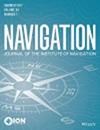Developing a Spoofer Error Envelope for Tracking GNSS Signals
IF 2
3区 地球科学
Q1 ENGINEERING, AEROSPACE
引用次数: 0
Abstract
Global navigation satellite systems (GNSSs) are the most significant service for global positioning and timing. The high relevance and wide spread of these systems contrast with the risk for interference or even manipulations of GNSS signals. One specific threat is GNSS spoofing. A spoofer counterfeits satellite signals to mislead the receiver to an erring position/time estimation. The tech - nological progress enabling affordable and easy-to-use spoofer hardware further increases the relevance of this threat. To maintain the integrity of the position/ time information, it is mandatory to be able to assess the errors induced by spoofing. The paper at hand derives a bound of the code tracking bias in relevant spoofing scenarios extending the well-known Multipath Error Envelope. These new bounds can be used as a tool to estimate the position/time error, especially but not exclusively for receivers that are collateral damage of a spoofing attack.开发用于跟踪GNSS信号的欺骗错误包络
全球卫星导航系统(gnss)是全球定位和授时最重要的服务。这些系统的高相关性和广泛传播与干扰甚至操纵GNSS信号的风险形成鲜明对比。一个具体的威胁是GNSS欺骗。欺骗器伪造卫星信号,误导接收机进行错误的位置/时间估计。技术进步使得价格合理且易于使用的欺骗硬件进一步增加了这种威胁的相关性。为了保持位置/时间信息的完整性,必须能够评估由欺骗引起的错误。本文推导了相关欺骗场景中代码跟踪偏差的边界,扩展了众所周知的多路径错误包络。这些新的边界可以用作估计位置/时间误差的工具,特别是但不限于受欺骗攻击附带损害的接收器。
本文章由计算机程序翻译,如有差异,请以英文原文为准。
求助全文
约1分钟内获得全文
求助全文
来源期刊

Navigation-Journal of the Institute of Navigation
ENGINEERING, AEROSPACE-REMOTE SENSING
CiteScore
5.60
自引率
13.60%
发文量
31
期刊介绍:
NAVIGATION is a quarterly journal published by The Institute of Navigation. The journal publishes original, peer-reviewed articles on all areas related to the science, engineering and art of Positioning, Navigation and Timing (PNT) covering land (including indoor use), sea, air and space applications. PNT technologies of interest encompass navigation satellite systems (both global and regional), inertial navigation, electro-optical systems including LiDAR and imaging sensors, and radio-frequency ranging and timing systems, including those using signals of opportunity from communication systems and other non-traditional PNT sources. Articles about PNT algorithms and methods, such as for error characterization and mitigation, integrity analysis, PNT signal processing and multi-sensor integration, are welcome. The journal also accepts articles on non-traditional applications of PNT systems, including remote sensing of the Earth’s surface or atmosphere, as well as selected historical and survey articles.
 求助内容:
求助内容: 应助结果提醒方式:
应助结果提醒方式:


